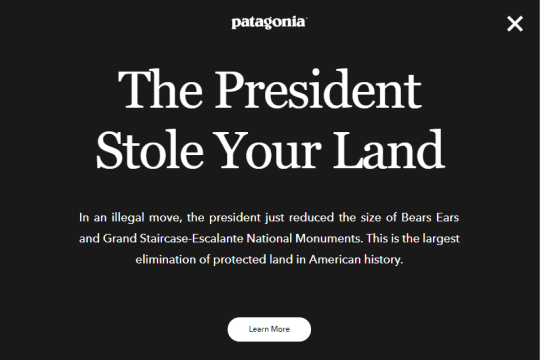By Glenn Taylor, Senior Editor

I’ll admit that outside of skimming through a few tweets, I
wasn’t too tuned in on the news that President Donald Trump signed a
proclamation to reduce the size of the Bears Ears and Grand Staircase-Escalante
national monuments in Utah. But a day after the news broke, Patagonia definitely got my attention
in displaying the statement “The
President Stole Your Land” on the front page of its web site.
The cutbacks of the two monuments totaled approximately two
million acres, the largest rollback of federal land protection in U.S. history.
Like many other politically charged issues, the decision drove debate —
but only until the next problem came up and the public consciousness moved on
to that.
However, Patagonia’s stance delivers by keeping this issue top
of mind for both its own shoppers and those who don’t shop at the brand. The statement
itself, bolded in white letters on a black screen, pulls no punches in getting
the shopper’s attention. It also conveys a sense of urgency by tying it to the
individual consumer, and how it affects them.
Shoppers Want
Socially Responsible Brands
The decision caters to a retail clientele that, at least on
the surface, appears to be more aware of who they’re buying from and what those
companies stand for. As of 2015, 66%
of global consumers said they were willing to pay more for products that come
from sustainable brands, up from 50%
in 2014, according to the Nielsen
Global Corporate Sustainability Report. Millennials are even more attached
to this idea, with 73% saying they
are willing to pay extra for sustainable offerings.
Additionally, 81%
of Millennials expect companies to make public declarations of their good
corporate citizenship, according to Horizon Media. The growing presence of Gen
Z also needs to be considered. This demographic identifies social
responsibility as the fourth-biggest factor in making a purchase, after price, quality and brand name.
Simply put, causes matter. Patagonia has made a commitment
to its own that transcends any product it sells or any marketing campaign it
might put out.
REI Joins In On Cause
Marketing
Fellow outdoor apparel and gear retailer REI knows a thing or two about this as
well, making
its own statement about the rollback as well as encouraging shoppers to
write to their elected officials and voice support for public lands. REI has
been vocal about causes in other ways, gathering widespread acclaim for its #OptOutside
social movement, which encourages shoppers
to do something fun outdoors instead of shopping on Black Friday. REI goes as
far as to close its stores and online site throughout the day while still
paying its employees. And the co-op sure hasn’t been hurting from the decision,
giving
back 70% of its 2016 full year profits to local outdoor communities.
Outdoor retailers aren’t the only companies who convey this politically
activated mentality around causes they respect. The recent
relief efforts for Hurricane Harvey showed that the biggest brands,
including Walmart, Amazon, The Home Depot, Lowe’s
and Target, are willing to donate to
those in need and rally their shoppers to do so.
But where Patagonia truly succeeds here is putting its cause
front and center, positioning itself not just as a retailer but as a movement. Retailers
are constantly trying to make themselves more relatable as competition
increases. What Patagonia and REI understand is that a big part of relatability
is giving consumers a chance to be part of something beyond a purchase.





